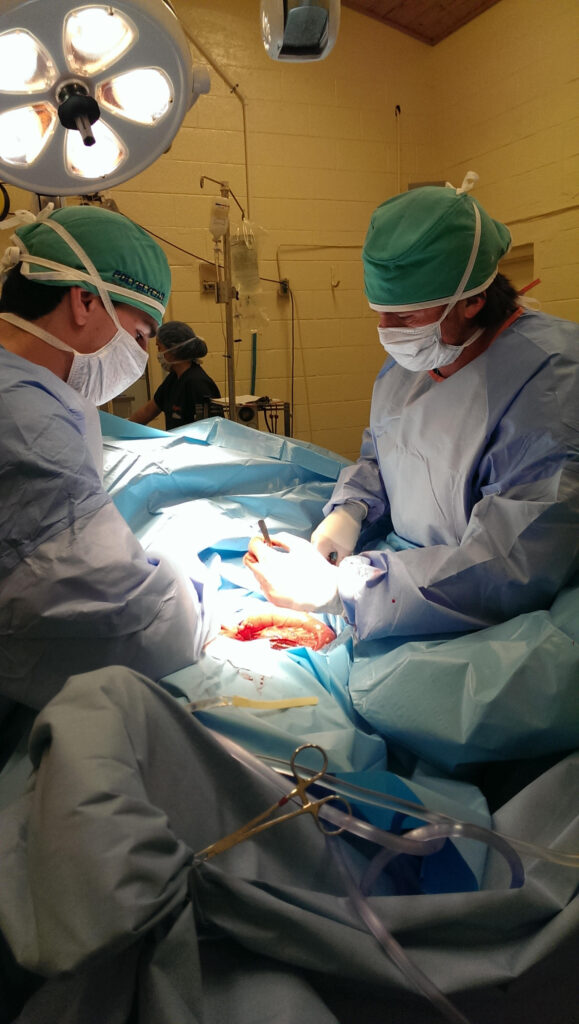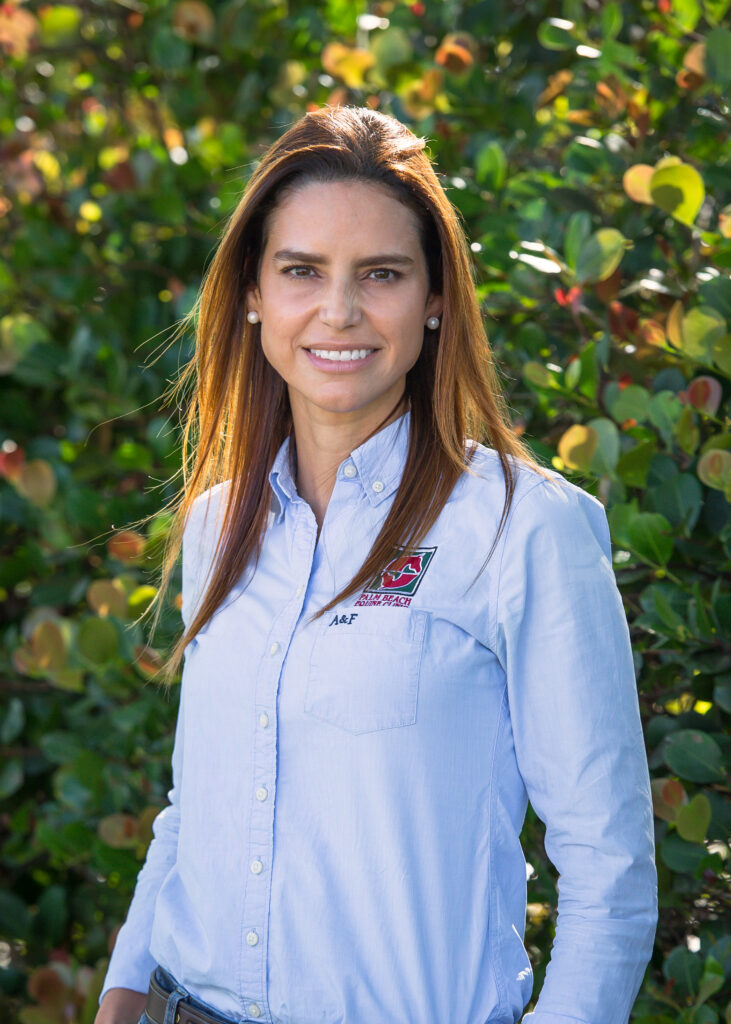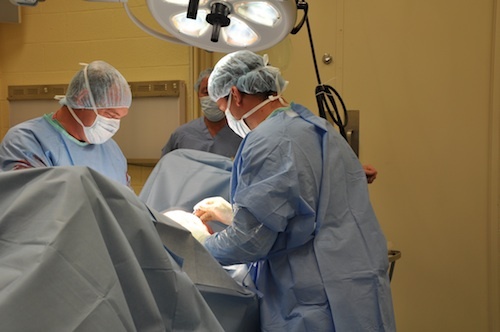Month: November 2017
Any horse owner’s worst nightmare is realized when their mount begins to show the dreaded signs of colic. For Jody Stoudenmier, a Wellington, FL, resident and avid dressage rider, she knows the symptoms all too well.

Patient History
Stoudenmier owns an 11-year-old American-bred Dutch Warmblood mare that joined her string of horses at the end of 2016 and has competed through the Intermediate II level. Sidelined by a suspensory injury last year, Beatrix was prescribed stall rest to aid in her recovery by Dr. Robert Scott of Scott Equine Services based in Ft. Lauderdale, FL. An unfortunate but common side effect of the necessary stall rest was colic. Beatrix suffered from six bouts of colic that were resolved without surgery when Dr. Scott referred Stoudenmier and Beatrix to Palm Beach Equine Clinic.
“She is such a wonderful mare; a nice mover, very athletic, sweet, sensitive, and easy to handle in the barn,” said Stoudenmier of the mare that regularly competes at the Adequan Global Dressage Festival during the winter season. “When she was recovering from her injury we tried everything to prevent her from colicking – diet, medications, hand walking – but, nothing seemed to be working.”
It was then that Palm Beach Equine Clinic’s board-certified surgeon, Dr. Weston Davis, suggested a laparoscopic surgical approach.
“Her colic had never progressed so far that we needed to do surgery before,” explained Stoudenmier. “But, at that point, I was open to anything! After speaking with Dr. Davis, I immediately had a positive feeling about it.”
Dr. Davis’ Surgical Procedure
The procedure that Dr. Davis suggested was an endoscopic ablation of nephrosplenic space. In layman’s terms, as a result of Beatrix’s colic, her colon was essentially getting caught or entrapped over the nephrosplenic ligament, which connects the left kidney to the spleen. When the colon is entrapped in this position, its contents cannot move through it and the colon becomes distended, causing the horse considerable pain, and the inevitable colic.

Dr. Davis’ solution was to close or perform an ablation of the nephrosplenic space to prevent further entrapment. The procedure can be conducted endoscopically where the horse does not have to be anesthetized, but undergoes a standing surgery with sedation and local anesthesia. A small incision is made in the left flank and the laparoscope is inserted through a smaller incision close by. The nephrosplenic space is then sutured closed so that the trough that forms the space between the kidney and spleen is obliterated and can no longer entrap the colon.
On October 9, 2017, Beatrix underwent a successful ablation of the nephrosplenic space at the hands of Dr. Davis.
“In the past, I have had several horses undergo surgery where they had to be anesthetized and it was very difficult to get them standing again after surgery,” said Stoudenmier. “We did not have that worry with Beatrix and the approach absolutely made a difference in her recovery.”
Post-Surgery Care and Recovery
Beatrix remained at Palm Beach Equine Clinic for a week and a half after surgery to jump-start her recovery before returning home to Stoudenmier, who has managed her post-surgery care with the help of both Dr. Davis and Dr. Scott.
“Dr. Davis was absolutely wonderful to work with,” said Stoudenmier of her experience at Palm Beach Equine Clinic. “He listened to my concerns, was patient, and kept his mind open.”
Dr. Davis paid a visit to Beatrix in mid-November to perform an ultrasound and together with Dr. Scott approved the mare to return to work. Stoudenmier has begun to introduce trot work into Beatrix’s routine and is optimistically expecting a full recovery, saying, “She looks super and everything looks good for the next two months. My goal by the end of the season is to get her back in the show ring!”
Meet PBEC Veterinarian Dr. Natalia Novoa

Dr. Natalia Novoa was born in Nashville, TN, and raised in Colombia, where she graduated from the University of La Salle. Upon returning to the United States, Novoa validated her degree in both the U.S. and Canada and received her chiropractic adjustments qualifications in Kansas and studied acupuncture in Florida. Novoa joined the Palm Beach Equine Clinic (PBEC) team for a short period in 2000, before spending several years following the hunter/jumper horse show circuit in Canada, Colorado, and Ocala, FL. She then re-joined the PBEC staff in 2011, and, with her veterinary license in Florida, Kentucky, North Carolina, and Canada, Novoa has been a valued member of their team ever since.
Q: How did you decide that you wanted to pursue veterinary medicine?
I have enjoyed having animals in my life since I was very young, but what was key to me deciding to pursue veterinary medicine was having a farm where I was able to gain skills and real-world experience that would prove handy down the road. I was able to practice with real medical cases and acquire knowledge in operational management, and it was an introduction to the lifestyle because it requires patience, hard work, commitment, determination, and accountability. It was a valuable opportunity to work hands-on in the environment with the veterinarian of my farm, absorbing, assimilating, and getting familiarized with the vet skills that were the building blocks for my future. He made me realize that veterinary medicine would fit me perfectly. That helped me set the foundation for my career, and since then, I didn’t have to look any further!
Q: What led you to PBEC?
I think of it like this: if I want to become the best at what I do then I have to work with the best, and I picked PBEC. They say, “Leadership is not about a title or designation. It’s about impact, influences, and inspiration.” Palm Beach Equine assumes the leadership role, chases the latest trends, and evolves continuously. In addition, we have a great team of skilled vets and staff who try to expand their vision and abilities to achieve success.
I have to say I have had seven great horse show seasons with Palm Beach Equine, and I’m looking forward to an eighth one. When you are doing what you love and you are working with great horses, time flies.
Q: What is your primary area of focus?

I focus on sports medicine and lameness, combining conventional medicine with alternative medicine; this includes chiropractic adjustments, acupuncture, and herbal therapy. To me those are great alternative tools for diagnosis and treatment. I have to say, they help you to look at a horse or a dog in a different way, and you have more tools and options. Regardless of the case – lameness, pain management, internal medicine, etc. – I have different choices to achieve results in those situations.
I perform chiropractic adjustments, acupuncture therapy, and laser treatments to small animals as well. Most horse people have dogs, so I’m able to take care of their companions too.
Q: What is a typical day like for you at PBEC?
It’s a busy agenda every day with continuous juggling. I’m usually dealing with lameness (involving diagnosis and treatment), doing pre-purchase exams, chiropractic adjustments, acupuncture therapies on horses and dogs, performing laser treatments, and at the end of the day, doing paperwork. Depending on the day, I could be doing FEI treatments, vet shift at the horse show, donating vet work at Vinceremos Therapeutic Riding Center, or dealing with an emergency. We’re a very mobile practice able to go from farm to farm and horse show to horse show (Kentucky; Tryon, NC; Ocala, FL), so I’m moving around a lot.
Q: What is your favorite part of the job?
There are so many aspects that I enjoy: working outdoors, closely with animals on a daily basis, and diagnosing and dealing with different issues to overcome problems; the privilege of working as a team with the clients and trainers and creating a great, close relationship with them; the connection with the animals and how they show you how grateful they are, and being able to see the improved outcome. There’s great satisfaction in successfully applying my knowledge and skills to a make a difference in someone’s life.

Q: Have you had any standout, favorite moments since beginning to work at PBEC?
When I had double success treating a ‘mystery’ case of a horse in which the owner was losing hope because other treatments were not showing good outcomes, and also treating her dog that was crying and unable to get in the car. The animals and owners were both happy and thankful. “For it is in giving that we receive” – having a positive impact on someone is correlated with high levels of overall job satisfaction.
Q: What do you enjoy doing outside of work?
I enjoy traveling with my daughter, Lola, and visiting my parents and siblings that live in different countries. I also love dancing to Latin music, running, playing tennis and squash. I’m a pretty competitive squash player, so I welcome any challengers!
Fear of colic is in the back of many horse owners’ minds, but with the expert care of Palm Beach Equine Clinic, owners can rest easy knowing that they have some of the world’s best surgeons and veterinarians at their disposal in the event of an emergency.
Colic 101
Characterized by abdominal pain or problems with the gastrointestinal tract, colic is something that often arises unexpectedly and from many different origins. Spoiled feed, abrupt changes in feed, parasite infestation, sand ingestion, lack of water consumption, and even excess stress or changes in the weather are among the numerous causes generally related to colic.
Colic Symptoms
Whatever the cause may be, the most important step any owner can take is to recognize the symptoms as early as possible and immediately call their veterinarian. Pawing, rolling, looking at abdomen, sweating, loss of interest in food and water, and absence of gut sounds in any of the four abdominal quadrants are some of the telltale signs of colic development. Unfortunately, colic can be fatal, but the proper knowledge and care may save your horse’s life. The sooner your veterinarian gets involved in treatment, the better your horse’s chance of survival.

Emergency Colic Care
In the event of an emergency, the veterinarians and surgeons of Palm Beach Equine Clinic are available 24/7 to offer the very best care for your equine partner. Palm Beach Equine Clinic is renowned for its referral full-service surgical center and intensive care hospital located in the heart of Wellington, Florida. Board-Certified surgeons, primary care veterinarians, and skilled hospital technicians are available to treat, monitor, and care for critical cases. With world-class veterinarians and a full staff of highly trained technicians, both clients and patients of Palm Beach Equine Clinic are in the best hands possible.
Surgical Capabilities
Palm Beach Equine Clinic offers the latest in technology as the surgical techniques are less invasive and result in faster recovery times for your horse. The surgical team leader, Dr. Robert Brusie, is a nationally renowned, Board-Certified surgeon. Dr. Brusie’s surgical specialties include orthopedic, arthroscopic, and emergency cases. Dr. Brusie has been the head surgeon with PBEC for the past 20 years.
“In the last ten years, colic surgery has come a long, remarkable way,” Dr. Brusie stated. “With our clients, if the horse needs to go to surgery, we get an approximately 95% success rate. We attribute that to the client’s excellent care of their horses, as well as their knowledge to contact us immediately. That being said, colic surgery is always the last resort. We try to help all horses improve medically first.”
Palm Beach Equine’s surgical suite and staff is prepared to handle all types of emergencies, day and night. The large team of 40 veterinarians includes three Board-Certified Surgeons who rotate on-call duties so every day is covered. This aids Palm Beach Equine Clinic veterinarians and all of Southeast Florida with the ability to treat their emergencies requiring surgical assistance as quickly as possible. The state-of-the-art intensive care hospital is equipped with top-of-the-line medical equipment, including digital video cameras for the clinicians to easily monitor their patients from any location, at any time.
